- Home
- Stephen Hunt
Void All The Way Down: The Sliding Void Omnibus Page 6
Void All The Way Down: The Sliding Void Omnibus Read online
Page 6
Skrat just halted, eyeing up his newest crewmember. ‘I wonder if this is what you human chaps mean when they say my prince has come? Somehow, one suspects not.’
‘Be nice,’ said Lana, her chair landing with a bump behind the two exotic creatures. She banged the centre of the web of straps holding her inside the chair and stepped out. ‘And I think you’ll find, Polter, that my ship is my ship. At least, the last time I checked her registration papers, that’s what I read.’
‘I was merely being courteous, revered skipper,’ said Polter, a slight tone of offence creeping into his voice. Calder watched fascinated at the play of mandibles as the navigator spoke. Gods, how long will it be before I get used to him? He rested his eyes on Lana instead. Far easier. She really was a beauty, and he found his eyes drifting down towards the firm padding around her chest, the buttons teasingly open around the top few buttonholes of her flight suit. Calder jerked his gaze back to her face. She didn’t notice that, did she? He was only gazing so intently at Lana because the two aliens on the bridge had disconcerted him, surely?
‘This is Skrat,’ said Lana, indicating the lizard. ‘If you ever shake hands with him on a deal, check your wrist to make sure you’ve still got all items of personal jewellery intact.’ She reached out and affectionately tapped the monstrous navigator’s carapace. ‘And this is Polter. He’s a little skittish around new people, but he’s the best navigator in this corner of the void. He can drop us down so close to a system’s gravity well that you can hear the water in our ship’s pipes boil in protest at the hyperspace translation.’
Calder looked in puzzlement at Lana. ‘Why would the water pipes boil?’
‘I got him started with the cop shows,’ apologised Zeno. ‘I’ll throw a few Hell Fleet episodes the kid’s way tomorrow, when his brain’s recovered enough that I don’t turn his mind into a hearty barbarian stew.’
‘Don’t want to fry the new man on the team,’ said Lana. ‘At least, not yet. Why don’t you explain to his highness how this lady flies, Polter?’
‘For a ship to enter hyperspace,’ said Polter, ‘she must jump far outside the gravity well of large planetary bodies such as worlds, suns, gas giants. Gravity fields exert too strong an interaction on the artificial wormholes created by the ship to cross into hyperspace. Jump out too close to a world through an unstable wormhole, and your engines will be fried, then you must exit hyperspace blind – maybe strike a world or moon. The balance of probabilities, however, is that you will simply be left derelict, floating in the void between the stars. Exit hyperspace too near to a system’s gravity well, and a similar devilish accident results. Your hyperspace engines will be destroyed. At least on the way into a system, you can signal your destination and pray that a rescue attempt can be made.’
‘Damn! Make salvage, is what you make,’ said Lana. ‘Goodbye ship, hello some vulture of a tug company and the wrecking yard. It’s a real art, plotting hyperspace translations. The nearer the system you’re entering or exiting, the more complex the math of the jump. But when you arrive light years out from a system, you’re left burning expensive fuel on your sub-light drive, wasting valuable time. Lucky for us, Polter is one of the best at what he does. A real artist.’
The explanation seemed almost as inexplicable to Calder as the navigator’s alien form. With a body like Polter’s, even trying to keep his fighting claws flat against the shell in a gesture of peace, the navigator appeared built for battle, not complex acts of chart reading and pilot mathematics. Just goes to show you, appearances can be deceptive. A little like my darling ex-fiancée. A smile as sweet as honey and a dagger tucked below her dress for your heart. ‘Will I be trained in this art, as one of the crew?’
Polter’s two manipulator hands danced about, a faint sim-memory alerting Calder that this was the Kaggenish race’s laughter. ‘No, indeed, Calder Durk. It takes about half an hour to translate a ship between the veil of the mortal universe and the blessed vaults of hyperspace. The act of doing so, of joining with the math, is highly addictive.’
‘Addictive?’
‘He ain’t kidding,’ said Zeno. ‘Polter here is an aesthete. Kags don’t get drunk or high or addicted to sims. Just the way they’re built. Tough on the outside, tough on the inside. In the early days of space travel, Earth used human navigators. Most humans lasted a maximum of five jumps before they had to be retired. After that, they just went crazy, chasing the hyperspace high. Kept on jumping their ship all the way to the next galaxy until the skipper put a bullet through their skull. Artificial intelligences can navigate a jump without getting addicted, but then you’ve also made your ship smart enough to want to bug off and do something more interesting than carrying fleshies about like donkey rides on the beach. Hell, even my android mind would get addicted if I jumped the ship regularly. My brain’s wiring is too damn close to yours.’
‘It is not a drug,’ insisted Polter. ‘To travel hyperspace is to travel through the lowest level of heaven. When you breech the mortal world you are connecting with God. It the holy bliss of the maker of all things that I feel. The kaggenish are the godliest of all creatures, thus it is we may travel within the creator’s rapture and blessing.’
‘So you say, short-stop,’ observed Zeno.
‘I keep on hoping for a miracle every time we jump,’ smiled Lana. ‘Like we might exit at some shizzle-hole world and find our anti-matter engines have been upgraded with some nice new shiny Rolls Royce models. Or discover my cargo holds have been filled with precious metals. That’s the sort of service this girl would be happy with if I were sliding heaven, rather than sliding void.’
‘God sends us life, revered skipper,’ corrected Polter, ‘that we might shape miracles from its raw materials.’
‘And right now we’ve been sent six-foot of disenfranchised nobleman,’ said Lana, banging Calder’s arm. ‘Although I’m damned if Rex Matobo is any kind of prophet. Talking of which, where’s my oracle of the drive rooms? I’m sure I ordered Zack Paopao to the bridge to meet our new crew.’
‘I intercepted the chief’s response to your missive,’ said Skrat. ‘The old boy was not particularly polite. The gist, I believe, was that he’s rather too busy to run about on ship socials when the engines are falling apart around his ears. There was considerably more profanity in his original memo, however.’
‘That’s no memo, that’s a cry for help,’ said Lana. She nodded slyly toward Calder. ‘And I think that’s just the place for a new crew on his uppers to learn the ropes on board. Wouldn’t you say?’
Calder had to wonder why all the others started laughing. The joke, I suspect, is on me.
***
Calder rode the rickety transport tube down the length of the Gravity Rose, listening to the bleeping of a short bipedal robot that was supposedly leading him towards the engine rooms. The low-level machine accompanying him was nothing like Zeno. A boxy four-foot tall slab of electronics with short waddling pipe-like legs. A collection of tool arms hung off either side in lieu of arms – little more than steel poles with pincers, diagnostic sensors, cutters, welders and assorted other tools. The robot had a single eye in the top-right hand corner of its flat casing, a lens behind a circle of glass that would open or contract as it stared short-sightedly at its human charge, whirring each time it refocused. It hummed and hawed and impatiently stamped its steel feet as it stood in front of the control panel at the transparent capsule’s nose. Every now and then, the robot interspersed a single word among the digital birdsong coming from the speaker on its front – usually follow or sometimes engines.
Calder had experienced his first episode of Hell Fleet now, served by Zeno like a pusher feeding his latest client. Calder’s sim avatar had started out as a console tech and board swapper in Hell Fleet, a junior programmer attached to a carrier vessel’s SysMaint division. It seemed an unglamorous start, but then, as Zeno had later proposed, that was the point. Most of the sims’ audience were stuck in similarly mundane white and blue collar jo
bs across the alliance. Lowly origins built up empathy with the viewer. When all the hardship pilots died later in a freak asteroid strike on the flight deck, it made becoming an emergency pilot – tape and virus-trained – feel like an actual achievement the viewer might have lucked into. The Gravity Rose made a lot more sense after the show, but everywhere Calder went, he was seeing things – experiencing things – with two sets of eyes. There was the modern thirtieth century perspective, where a robot like this was just a Sony R4-serv180 maintenance model, as ubiquitous on a ship’s decks as the Model T automobile was on the highways of an earlier age. Then there was the viewpoint of Prince Calder Durk, where the walking box was nothing more than the iron golem of Zeno, himself a creation of even greater sorcery. The modern frame of reference laid over the real, hard, primitive life that was his own until recently. Calder’s semi-perpetual sense of disorientation wasn’t helped by the fact that he was living his tightly compressed artificial sim life through the character and personality of an avatar, experiencing adventures that weren’t his. It was a mind shizzle of epic proportions. Was he watching a great metal temple move magically through the star-spattered heavens? Was he riding a half-arsed independent merchantman, the bane of every TAP agent and in-system police officer, with their smuggling, unlicensed cargoes and chancers’ scruples? Or was he rattling through an antique held together with sticking plaster and unfounded optimism – the class of ship that wouldn’t stand up to the first pass from the hardships of a carrier’s fighter wing? Hell, they’d be lucky to survive the radiation blast from a warning shot across the bows.
The trouble was, none of those competing worldviews seemed real to Calder, least of all the first twenty years of his life on Hesperus. Perhaps I should be glad of that. Reality should be freezing out in the plains. The hand of every loyal villager turned against me for the reward Sibylla’s placed on my head. Real would be having my feet chained in a pot in front of Narvalo’s walls and watching it filled with oil before some nice priest arrives to entertain the mob with a burning torch. If sorcery this be, then I suppose my hat should be doffed to Matobo the Magnificent. Everywhere Calder travelled on the ship felt as warm as a banqueting hall crammed with guests and toasted by a dozen roaring fireplaces. Not just the warmth he felt when he was in Lana Fiveworlds’ presence, either. He’d almost forgotten what feeling cold was like – and as a prince royal, he’d felt the chill a lot less frequently than most. Well, it was always said that heaven’s fields beyond the Halls of the Twice-born lay as a perpetual paradise. Happy to report, it’s true. Somehow, Calder didn’t think the priests had the Gravity Rose in mind when they’d sung their hymns. The Gravity Rose was less like the ice schooners of Calder’s experience. She seemed closer to a deserted city, empty except for a handful of crew and thousands of semi-autonomous machines that tended acres of echoing, empty cargo chambers, every space as still as a cathedral. Deck after deck of uninhabited passenger cabins, each identical with neatly made beds and powered down entertainment cubicles, each as devoid of human life as the next. Restaurants and large communal areas, all powered down and waiting the reanimating touch of contract stewards and stewardesses to run the decks. Even the vessel’s hydroponics domes, filled with lush tropical forests where you might – at a push – pretend you were under an honest farmers’ greenhouse – sat empty of woollen-gloved yeomen tending the soil, air inside the domes far too humid to be back on Hesperus. That was without agricultural robots climbing up trunks and spraying fruit, turning over the soil, a hanging mesh of irrigation pipes blasting mists of water and plant food into the undergrowth. The whole ship had the air of a metropolis emptied in the face of a horde’s approach. Waiting to be possessed by the first band of raiders to breech its unmanned gates.
Ahead of the transport capsule, Calder noted the plate-like circumference of the blast shield approaching, a massive one-mile high dish protecting the rest of the ship from the brute reactions that occurred at the vessel’s business end. The princely part of Calder marvelled that there was enough iron in the world to cast such an artificial bulwark. The fleet ensign from Zeno’s sim merely looked at the dark cratered mass, pitted by age and countless engine boosts, and couldn’t believe that any shipyard had actually granted a flight worthiness certificate to this ageing iron-carbon composite – barely able to take half the thrust of a modern carrier’s engine shielding. Approaching the shield, Calder’s capsule tilted down and rode the monorail into the ship’s interior, passing through the centre of the shield and out along one of five connecting struts – each the size of an oilrig’s legs – that joined the ship’s engines to the rest of the craft. Like the Eiffel Tower turned horizontal, girder after girder shot past Calder, the armoured disc behind him now, along with the command, cargo, crew and passenger quarters. Half way along the connecting struts he shot past a rotating set of vanes, seven of them circling about, lazily, as if someone had taken it into their mind to build a windmill capable of harnessing solar winds for their foundry. And in a manner of speaking, it was a foundry – a mill capable of distorting space-time through an artificial singularity and initiating a translation of the whole vessel into hyperspace. Sensitive enough to field interference they had to be well clear of the solar system’s mass to jump into hyperspace. They were currently heading out of Hesperus System, rising straight on a vertical trajectory, the quickest way to break free of the tyranny of the local gravity well. Calder couldn’t see the frosty orb of his home now. It was no longer visible to the naked eye. With nearly a subjective year of sim living under his belt, it seemed an age ago he had been stumbling through the lethal snowfields, his heart thumping in fear as he fled for his life with loyal old Noak by his side. In reality, he had been gone less than a week, the Gravity Rose boosting up towards light speed, distant stars crawling past. No wonder Calder was beset by panic attacks. Half the time it felt as though he didn’t know where he was, who he was or even when he was. Exiled in every way possible.
It only took a second for Calder to pass through the rotating shadow of the vanes and then he was sliding towards the engines. At the far end of the connecting struts lay the ship’s drive section. A hexagonal power plant dotted with great spherical structures like mushrooms infesting a tree trunk. Enough room for a sizeable fusion plant to power the ship’s internal systems when the vessel’s solar panels were too far away from a sun to operate comfortably; more acres and cathedral-like vaults to house the hyperspace engines and in-system antimatter pion reaction drive.
Slowing on the connector strut, the capsule decelerated for the first in a series of vault-thick doors to swing open along the tube into the engine block. As if Calder’s capsule was packed full of valuables and being gently stored in a safety deposit box. In reality, the width of the walls was as much to protect the universe outside from the contents of the drive chamber as to keep the engines safe from asteroid strikes and pirate assaults. There wasn’t much point piloting a starship unless you could enter a solar system at the end of your journey, and most worlds’ inhabitants rightly got very nervous about vessels coming in leaking radiation and other exotic particles. Even with missile silos, fighter bays full of hardships, rail cannons, lasers and the associated panoply of combat, the main difference between a warship and a freighter like the Rose was largely one of intent. Flying the Gravity Rose into a world’s surface at just under the speed of light would result in one hell of an insurance loss for the inhabitants. The ship’s monorail emerged from the long armoured tunnel into a large chamber, a central floor filled with a series of lozenges, each a steel and crystal construction the size of an apartment block, the crystalline portion of their surfaces gently pulsing with blue light. After six simulated months sharing the sensibilities of an ensign in Hell Fleet, this hyperspace translation matrix was still as good as black magic to Calder – largely because it might as well have been sorcery to his fleet avatar. For all the analogies heaped upon the understanding of such devices – think of it as knife to slice into the deeper re
alities of the universe – think of it as a translation device to convert the mathematical language of one reality into another – think of it as a piano’s tuning fork to . . . no, think of it as a big steaming shizzle-pile of the wrath of the gods, able to mangle the stuff of creation, mould it into spears and hurl it like one of Vega’s thunderbolts across the Creators’ phantasmal realm. Calder’s barbarian explanation made as much sense as any the sims had provided with their talk of advanced Brane theory, affine-parameters and T-duality. His capsule pulled in behind a pod already docked at a halt and the robot driver at the front stomped around, tweeting static in-between its follow follow. A door on the side of the capsule rolled into the roof, allowing man and machine to step onto a viewing gantry overlooking the jump matrix. There was a second Sony unit waiting for them, the two robots sharing a burst of communication before forming up behind each other and waddling off. Unlike the robot from the pod, this new boy had its front panel painted white with black characters scrawled across it. The language virus which had burnt the alliance’s lingua franca, Lingual, into Calder’s skull, provided no comprehension of the writing; but part of his sim learning dimly signalled that these were Sino characters or similar. Lots of Chinese-racial worlds inside the Triple Alliance – Calder’s partner in the Hard TAP sim had been one Fu-han Meng. A racist cop voice rose with him, sighing: With a surname like Paopao, you think the chief of the drive rooms is going to be Färsk Nordic rather than a chink?

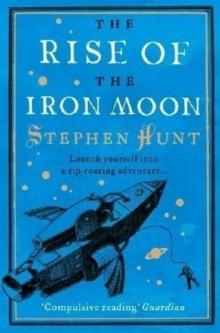 The Rise of the Iron Moon
The Rise of the Iron Moon Empty Between the Stars (The Songs of Old Sol Book 1)
Empty Between the Stars (The Songs of Old Sol Book 1) From the Deep of the Dark
From the Deep of the Dark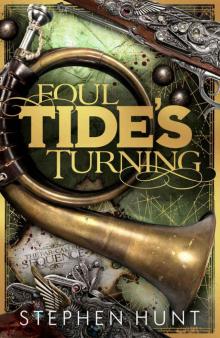 Foul Tide's Turning
Foul Tide's Turning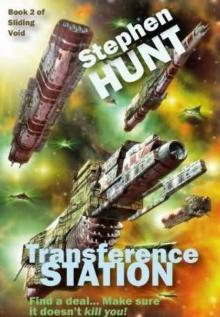 Transference Station
Transference Station Secrets of the Fire Sea j-4
Secrets of the Fire Sea j-4 Void All The Way Down: The Sliding Void Omnibus
Void All The Way Down: The Sliding Void Omnibus The Kingdom Beyond the Waves j-2
The Kingdom Beyond the Waves j-2 From the Deep of the Dark j-6
From the Deep of the Dark j-6 The Court of the Air
The Court of the Air The Court of the Air j-1
The Court of the Air j-1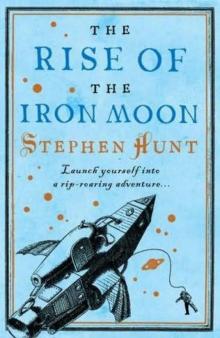 The rise of the Iron Moon j-3
The rise of the Iron Moon j-3 Jack Cloudie j-5
Jack Cloudie j-5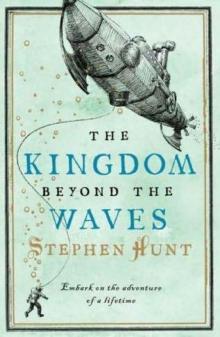 The Kingdom Beyond the Waves
The Kingdom Beyond the Waves The Stealers' War
The Stealers' War In Dark Service
In Dark Service